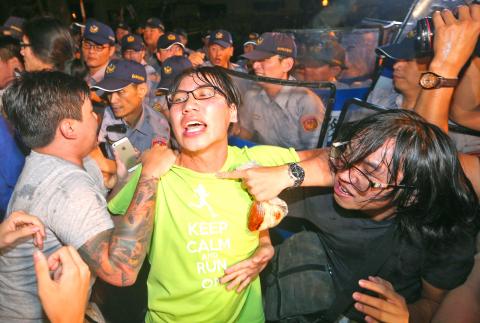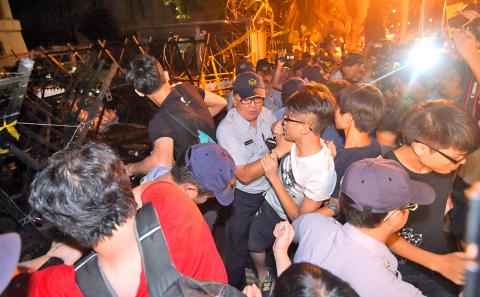High-school student protesters and civic groups yesterday rallied outside the Ministry of Education building in Taipei, demanding the release of students arrested in the early hours of the morning after breaking into the complex.
“We demand that our comrades be immediately released and not be subjected to violent judicial hunting,” Taoyuan High School Alliance spokesperson Liao Hao-hsiang (廖浩翔) said.
“If the ministry does not give us a reasonable and positive response today, we will continue our protest, refusing to bend in spite of last night’s [Friday morning’s] violent expulsion,” he said.

Photo: CNA
He repeated demands that proposed adjustments to high-school curriculum guidelines be removed and that new regulations covering adjustments be introduced to prevent a repetition of the controversy.
The curriculum guidelines have sparked protests over what critics call a “China-centric” focus and an opaque “black box” approval process.
Hsinchu and Miaoli Anti-Curriculum Guidelines Working Group convener Mu Yu-feng (慕宇峰) said the ministry’s stance had “compelled” students to take more extreme measures.

Photo: Wang Min-wei, Taipei Times
“We have already tried numerous peaceful protests and the government has lost a lawsuit, but it has remained totally unmoved,” Mu said.
The ministry is appealing a ruling by the Taipei High Administrative Court ordering it to release a complete list of the curriculum review committee members, along with meeting minutes and voting results.
Northern Taiwan Anti-Curriculum Changes Alliance spokesperson Wang Pin-chen (王品蓁) said the ministry had refused to allow public meetings between activists and Minister of Education Wu Se-hwa (吳思華) or his deputies.
“On this matter, we have been like a mute person eating canker root — there is no choice but to suffer in silence,” Wang said.
At a forum on Thursday night, K-12 Education Administration Director Wu Ching-shan (吳清山) did not take the students seriously, instead repeating ministry talking points like a “skipping needle,” she said.
She said students decided at an impromptu meeting to break into the ministry compound after they stormed out of the forum, denying that there was any involvement by external political forces.
More than 20 students scaled barricades late on Thursday night, forcing open two side doors and locking themselves in the minister’s second-floor office.
Other than a side door found off its hinges, it was unclear whether there had been any damage, with students claiming that they had not damaged anything in the offices.
While the ministry said in a press release that students had damaged a reception desk and broken down the minister’s office door, officials blocked reporters from accessing the ministry’s second floor yesterday morning, claiming that damage to the site had already been restored to allow the ministry to conduct normal operations.
A video recorded by a student and posted online showed an impromptu barricade of chairs and potted plants against an office door, but there were no visible signs of damage.
Before the person behind the camera was subdued, police were shown dragging protesters across the office floor, with a line of others yelling slogans as they sat at the back of the room.
The ministry said 33 people had been arrested: 24 students, three reporters and six non-student protesters.
Eleven minors were among those arrested, it said.
Following news of the students’ arrests, more than 100 people gathered outside the ministry complex early yesterday morning to demand their release. They were later dispersed by police.
Wang said that all but one of the students were handcuffed and refused access to their mobile phones, making it impossible for their parents to contact them.
Taiwan Association for Human Rights legal specialist Hsu Jen-shuo (許仁碩) said the handcuffing of students was “disproportionate” and a breach of the Police Power Exercise Act (警察職權行使法), which allows handcuffing only if someone attempts to escape or resists arrest.
Because the students were only sitting in protest before they were arrested, the police had no right to handcuff them and indirectly deprive them of their ability to contact a lawyer or their parents, Hsu said.

CHAOS: Iranians took to the streets playing celebratory music after reports of Khamenei’s death on Saturday, while mourners also gathered in Tehran yesterday Iranian Supreme Leader Ayatollah Ali Khamenei was killed in a major attack on Iran launched by Israel and the US, throwing the future of the Islamic republic into doubt and raising the risk of regional instability. Iranian state television and the state-run IRNA news agency announced the 86-year-old’s death early yesterday. US President Donald Trump said it gave Iranians their “greatest chance” to “take back” their country. The announcements came after a joint US and Israeli aerial bombardment that targeted Iranian military and governmental sites. Trump said the “heavy and pinpoint bombing” would continue through the week or as long

TRUST: The KMT said it respected the US’ timing and considerations, and hoped it would continue to honor its commitments to helping Taiwan bolster its defenses and deterrence US President Donald Trump is delaying a multibillion-dollar arms sale to Taiwan to ensure his visit to Beijing is successful, a New York Times report said. The weapons sales package has stalled in the US Department of State, the report said, citing US officials it did not identify. The White House has told agencies not to push forward ahead of Trump’s meeting with Chinese President Xi Jinping (習近平), it said. The two last month held a phone call to discuss trade and geopolitical flashpoints ahead of the summit. Xi raised the Taiwan issue and urged the US to handle arms sales to

BIG SPENDERS: Foreign investors bought the most Taiwan equities since 2005, signaling confidence that an AI boom would continue to benefit chipmakers Taiwan Semiconductor Manufacturing Co’s (TSMC, 台積電) market capitalization swelled to US$2 trillion for the first time following a 4.25 percent rally in its American depositary receipts (ADR) overnight, putting the world’s biggest contract chipmaker sixth on the list of the world’s biggest companies by market capitalization, just behind Amazon.com Inc. The site CompaniesMarketcap.com ranked TSMC ahead of Saudi Aramco and Meta Platforms Inc. The Taiwanese company’s ADRs on Tuesday surged to US$385.75 on the New York Stock Exchange, as strong demand for artificial intelligence (AI) applications led to chip supply constraints and boost revenue growth to record-breaking levels. Each TSMC ADR represents

State-run CPC Corp, Taiwan (CPC, 台灣中油) yesterday said that it had confirmed on Saturday night with its liquefied natural gas (LNG) and crude oil suppliers that shipments are proceeding as scheduled and that domestic supplies remain unaffected. The CPC yesterday announced the gasoline and diesel prices will rise by NT$0.2 and NT$0.4 per liter, respectively, starting Monday, citing Middle East tensions and blizzards in the eastern United States. CPC also iterated it has been reducing the proportion of crude oil imports from the Middle East and diversifying its supply sources in the past few years in response to geopolitical risks, expanding